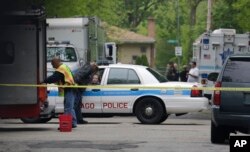The number of homicides in the United States jumped for a second year in a row last year amid an increase in overall violent crime in the country, according to the FBI's annual crime statistics released Monday.
There were an estimated 17,250 murders in the U.S. in 2016, up 8.6 percent over 2015 and more than 20 percent higher than the 2014 levels, according to the FBI's Uniform Crime Reporting data. The murder rate also rose, from 4.9 to 5.3 per 100,000 residents.
The spikes, the largest for a two-year period since U.S. crime rates peaked in 1991, raised questions about whether the United States is in the midst of a fresh violent crime spree after nearly two decades of declines.
While overall violent crimes such as murder and aggravated assault remain low by historic standards, the Department of Justice said the FBI report "reaffirms that the worrying violent crime increase that began in 2015 after many years of decline was not an isolated incident."
The FBI's closely watched report tallies four categories of violent crime — murder, rape, robbery and aggravated assault. The report showed that overall violent crimes increased by 4.1 percent in 2016, after rising by 3.3 percent in 2015.
Increases across the U.S.
The increases in violent crime were seen across much of the country, with cities large and small reporting rises. Approximately 70 percent of American cities with at least 20 murders in 2014 reported increases during the two-year period, said Jeff Asher, a New Orleans-based crime analyst.
"It suggests that it is a national trend and not just a thing we can blame on Chicago or something we can blame on Baltimore," Asher said. "It is happening in a lot of American cities."
However, Asher noted that violent crime remains "extremely geographically isolated."
In the past two years, for example, Chicago and Baltimore, the country's two most violent cities, accounted for 15 percent of the increase in the number of murders in the country.
Last year, the number of murders in Chicago jumped to 765 from 478 the year before, accounting for 22 percent of the overall increase in U.S. homicides. Half of the increase in Chicago came from just five neighborhoods in the city, said John Pfaff, a Fordham University law professor and statistician.
"There are five neighborhoods in Chicago with 9 percent of the city's population that explains 10 percent of the national increase in murder," Pfaff said.
Fresh wave of crime?
Pfaff questioned the notion that the country may be faced with a fresh wave of violent crime.
"It's not that crime rose across the United States," he said. "It is that very small pockets in a lot of places saw a rise in homicide and other crime."
Pfaff said it is premature to say the FBI data suggests the start of a long-term uptick in violent crime.
"Could it be a trend? Absolutely," he said. "But it certainly doesn't confirm it's a trend in one way or another."
In a report released earlier this month, the Brennan Center for Justice at New York University School of Law projected a slight decrease in violent crime, with the 2017 murder rate projected to fall by 2.5 percent.
President Donald Trump and U.S. Attorney General Jeff Sessions, however, have pointed to the rise in violent crime over the past two years to argue for tougher policing and other law enforcement policies. Sessions has vowed to confront what he called "the rising tide of violent crime in America."
"The Department of Justice is committed to working with our state, local, and tribal partners across the country to deter violent crime, dismantle criminal organizations and gangs, stop the scourge of drug trafficking, and send a strong message to criminals that we will not surrender our communities to lawlessness and violence," Sessions said in a statement.





